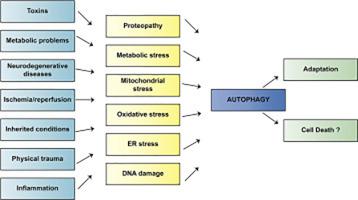当前位置:
X-MOL 学术
›
J. Mol. Biol.
›
论文详情
Our official English website, www.x-mol.net, welcomes your
feedback! (Note: you will need to create a separate account there.)
Autophagy as a Cellular Stress Response Mechanism in the Nervous System.
Journal of Molecular Biology ( IF 4.7 ) Pub Date : 2020-01-18 , DOI: 10.1016/j.jmb.2020.01.017 Nesibe Peker 1 , Devrim Gozuacik 2
Journal of Molecular Biology ( IF 4.7 ) Pub Date : 2020-01-18 , DOI: 10.1016/j.jmb.2020.01.017 Nesibe Peker 1 , Devrim Gozuacik 2
Affiliation

|
Cells of an organism face with various types of insults during their lifetime. Exposure to toxins, metabolic problems, ischaemia/reperfusion, physical trauma, genetic diseases, neurodegenerative diseases are among the conditions that trigger cellular stress responses. In this context, autophagy is one of the mechanisms that supports cell survival under stressful conditions. Autophagic vesicle engulfs the cargo and transports it to lysosome for degradation and turnover. As such, autophagy eliminates abnormal proteins, clears damaged organelles, limits oxidative stress and helps to improve metabolic balance. Nervous system cells and particularly postmitotic neurons are highly sensitive to a spectrum of insults, and autophagy emerges as one of the key stress response mechanism, ensuring health and survival of these vulnerable cell types. In this review, we will overview mechanisms through which cells cope with stress, and how these stress responses regulate autophagy, with a special focus on the nervous system.
中文翻译:

自噬作为神经系统中细胞应激反应的机制。
生物细胞在其一生中会遭受各种类型的侮辱。接触毒素,代谢问题,缺血/再灌注,身体创伤,遗传疾病,神经退行性疾病都是引发细胞应激反应的条件。在这种情况下,自噬是在压力条件下支持细胞存活的机制之一。自噬囊泡吞没货物并将其运输至溶酶体进行降解和周转。因此,自噬消除了异常蛋白质,清除了受损的细胞器,限制了氧化应激并有助于改善代谢平衡。神经系统细胞,尤其是有丝分裂后神经元对一系列损伤高度敏感,自噬已成为关键的应激反应机制之一,从而确保了这些脆弱细胞的健康和生存。
更新日期:2020-01-18
中文翻译:

自噬作为神经系统中细胞应激反应的机制。
生物细胞在其一生中会遭受各种类型的侮辱。接触毒素,代谢问题,缺血/再灌注,身体创伤,遗传疾病,神经退行性疾病都是引发细胞应激反应的条件。在这种情况下,自噬是在压力条件下支持细胞存活的机制之一。自噬囊泡吞没货物并将其运输至溶酶体进行降解和周转。因此,自噬消除了异常蛋白质,清除了受损的细胞器,限制了氧化应激并有助于改善代谢平衡。神经系统细胞,尤其是有丝分裂后神经元对一系列损伤高度敏感,自噬已成为关键的应激反应机制之一,从而确保了这些脆弱细胞的健康和生存。











































 京公网安备 11010802027423号
京公网安备 11010802027423号